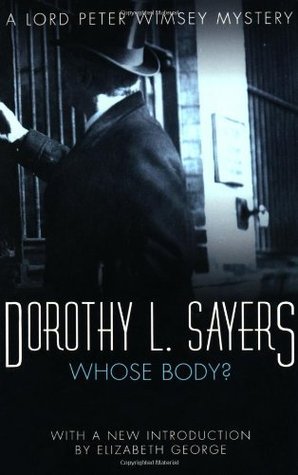 Whose Body?, Dorothy L. Sayers
Whose Body?, Dorothy L. Sayers
The first time I read Whose Body?, I don’t think I thought much of it. Little did I know. It’s not just that I’ve come to love the character — though I do — and the actors who’ve portrayed him, the various adaptations, etc. It’s that Sayers is just so damn clever. Even in Whose Body?, which is far from my favourite, you’ve got the mystery to untangle and then you’ve got all the background references to stuff. I keep finding myself looking up names of murderers and famous poisoning victims and random books and… all the sorts of things that Sayers has Wimsey just know. It’s always very gratifying (to borrow a phrase from Bunter) when I know what she’s talking about right away; it lets you feel like part of the cleverness, though I never feel left out when I don’t understand it.
One thing Sayers was very good at is the convoluted type of mystery, replete with five or more red herrings and careful timetables. This might strike you as pretty contrived, and if you’re particularly literally minded, you might wonder how Wimsey, Parker and Bunter always manage to find such convoluted mysteries, which unravel as soon as you hit upon that key detail (x wanted to marry y once, this book is important, he corresponds in French, which tube of paint was missing, when did a new Property Act come into force, etc). If that’s likely to bother you, then Wimsey might not be able to charm you out of it.
But despite all that, it’s not all about the cleverness or the convoluted plots. It’s also about Peter, who is revealed more and more with each book as a good man, as someone with a fragile core, as someone who struggles between responsibility and his love of the chase. And then there’s other characters like Bunter and Parker, good people themselves who are devoted to him, and who you want to see more of…
And Harriet. Just wait until we meet Harriet.
Rating: 4/5

I’m so IN on the Sayers love.
I don’t get people who aren’t, really. <3
Yeah, there’s a school of thought that has issues with Sayers accurately depicting the social mores of her classist, hierarchical, ethnocentric time. Which i honestly dont understand because some of these same people don’t have a problem with Dumas, or Dickens, or Austen accurately reflecting the classist insularity of their times. Is it because shes in the 20th century so its not supposed to be olden days? I don’t know.
I can see not enjoying it for that, but not getting at Sayers herself for being of her time. What else could she be?
She’s almost too convoluted for my tastes, but it’s the relationships that keep me reading.
I can see that point of view, definitely. Five Red Herrings cheats, too, by not giving you a vital piece of information (though it’d only make sense to a painter anyway). It’s definitely the relationships that attract me too — I can’t fathom not loving Wimsey, Parker, Bunter and Vane.
I’ve loved Peter for over 40 years, wish I could meet him!!
Yep!